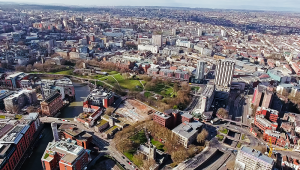23 February 2001
But they really only have themselves to blame. They loaded the gun, pointed it firmly at the city's schools budget and put the public's finger on the trigger.
Despite being warned about the damage to education spending, more than half of the 115,706 residents who took part in the referendum registered their vote for a council tax freeze. That now leaves the council trying to identify £4.5m in cuts, which it still maintains will have to come from education.
George Micklewright, the council's leader, puts a brave face on the result. 'As an exercise in getting people involved in local democracy, the referendum has clearly been a great success. Substantially more people participated than the number who vote in local elections these days and there can be no doubt that the result is representative of public opinion in the city.
'We said one of the main reasons for having the referendum was that we did not know how many people in Bristol thought it more important to increase spending on education this year and how many thought it more important to freeze the council tax for a third year. Now we know.'
The London Borough of Croydon, which has also announced the result of its referendum, says it was a 'thoroughly valuable and worthwhile exercise in local democracy'. With no major services under threat from any of its 2%, 3.5% or 5% options, this referendum was always going to be less sensitive than the one in Bristol. But the fact that residents voted for the lowest rise on offer (2%) could be significant.
The Conservatives say the two referendum results were 'evidence of a taxpayers' revolt' against the 'ultimate stealth tax'. But away from the froth of political point-scoring, the results are likely to have a major impact on future town hall consultation.
Micklewright was right in his pre-referendum comment that 'other local authorities and the government will be following our progress closely'. But how many councils will now be having second thoughts about the wisdom of using a referendum to set budgets?
Bristol claims the implications of each tax option were clearly, if briefly, explained, so it has little cause to complain about the result. But given the complexities of local government finance, should councils hand over such major decisions, particularly if vital services like education are at risk? Should a tax freeze even have been on the table?
'What the Bristol referendum shows us is never offer zero as an option if you are not serious about it,' says Ben Page, director of government services at pollsters Mori. 'We know older people are much more likely to have taken part and they tend to be very conservative about tax increases. Although they should be the biggest beneficiaries of maintained or higher spending, if given an option they'll vote against [tax rises].'
Page adds that if an opinion poll had been run, using a representative sample of the city's population, a different result would probably have emerged.
A spokesman for Bristol says that, given the perception of high council tax levels, a ballot that had not included a 0% option would not have been credible.
The results tend to give credence to the accepted wisdom that people don't vote for tax rises, a belief that the Milton Keynes referendum two years ago – when local people voted for a cap-busting council tax rise – had turned on its head.
Many councils may now prefer the approach taken by the London Borough of Enfield. Its green budget, which involved detailed financial consultation with lobby groups and samples of residents, is likely to lead to the council setting a 9% tax increase. The council still received concerned comments about high rises, but retained final control over the budget – the 'smoke but don't inhale' approach to budget consultation.
The turnouts in both referendums (40% in Bristol, 35% in Croydon) were good compared with many recent local elections. And both councils had some encouraging success with use of the Internet. But would they attract the same level of support year after year?
Bristol's Liberal Democrat opposition was this week suggesting that proceeds from the recent sale of Bristol airport could be used to prop up the education budget while still freezing council tax. Indeed, proposals are now on the table to use £2m from the airport to minimise the hit on education. But the council insists that using a non-recurring windfall would only provide a 'one-off fix' and that the full cuts would have to be made next year.
Whether the events in the West Country and south London put other councils off referendums remains to be seen. But there are some clear lessons that have to be learnt. One is only offer options you can live with. But councils also have to be much better at communicating with the public. Standard Spending Assessments and gearing may not be easy to explain, but councils have to make an effort if budget consultation is to be meaningful.
PFfeb2001



















